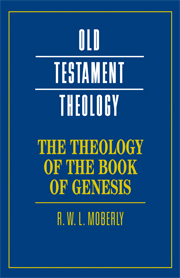Book contents
- Frontmatter
- Contents
- General Editors' Preface
- Preface
- List of Abbreviations
- 1 WHAT IS A “THEOLOGY OF GENESIS”?
- 2 ON READING GENESIS 1–11
- 3 GENESIS 1: PICTURING THE WORLD
- 4 GENESIS 2–3: ADAM AND EVE AND “THE FALL”
- 5 GENESIS 4: CAIN AND ABEL
- 6 GENESIS 6–9: CATACLYSM AND GRACE
- 7 ON READING GENESIS 12–50
- 8 GENESIS 12:1–3: A KEY TO INTERPRETING THE OLD TESTAMENT?
- 9 GENESIS 12:3A: A BIBLICAL BASIS FOR CHRISTIAN ZIONISM?
- 10 GENESIS 22: ABRAHAM – MODEL OR MONSTER?
- 11 ABRAHAM AND THE “ABRAHAMIC FAITHS”
- 12 GENESIS 37–50: IS JOSEPH WISE?
- Further Reading
- Author Index
- Scripture Index
- Subject Index
8 - GENESIS 12:1–3: A KEY TO INTERPRETING THE OLD TESTAMENT?
Published online by Cambridge University Press: 05 June 2012
- Frontmatter
- Contents
- General Editors' Preface
- Preface
- List of Abbreviations
- 1 WHAT IS A “THEOLOGY OF GENESIS”?
- 2 ON READING GENESIS 1–11
- 3 GENESIS 1: PICTURING THE WORLD
- 4 GENESIS 2–3: ADAM AND EVE AND “THE FALL”
- 5 GENESIS 4: CAIN AND ABEL
- 6 GENESIS 6–9: CATACLYSM AND GRACE
- 7 ON READING GENESIS 12–50
- 8 GENESIS 12:1–3: A KEY TO INTERPRETING THE OLD TESTAMENT?
- 9 GENESIS 12:3A: A BIBLICAL BASIS FOR CHRISTIAN ZIONISM?
- 10 GENESIS 22: ABRAHAM – MODEL OR MONSTER?
- 11 ABRAHAM AND THE “ABRAHAMIC FAITHS”
- 12 GENESIS 37–50: IS JOSEPH WISE?
- Further Reading
- Author Index
- Scripture Index
- Subject Index
Summary
It is perhaps unusual for a book within the Old Testament to have one particular text that can be regarded as a possible interpretative key to the book as a whole, and even to the Old Testament as a whole. Yet such a case has been made in relation to God's call of Abraham in Genesis 12:1–3:
Now the lord said to Abram, “Go from your country and your kindred and your father's house to the land that I will show you. I will make of you a great nation, and I will bless you, and make your name great, so that you will be a blessing. I will bless those who bless you, and the one who curses you I will curse; and in you all the families of the earth shall be blessed [or: by you all the families of the earth shall bless themselves].”
The intrinsic significance of this passage is not in doubt. For its context makes it a bridge between God's dealings with the world in general in Genesis 1–11 and his dealings with the patriarchs in particular in Genesis 12–50. These are also words on the lips of God, which clearly introduce and frame the story of Abraham that follows.
Enormous significance is attached to this passage by Paul, who cites part of it, together with Genesis 15:6, in Galatians 3:6–9:
Just as Abraham “believed God, and it was reckoned to him as righteousness,” so, you see, those who believe are the descendants of Abraham. […]
- Type
- Chapter
- Information
- The Theology of the Book of Genesis , pp. 141 - 161Publisher: Cambridge University PressPrint publication year: 2009



